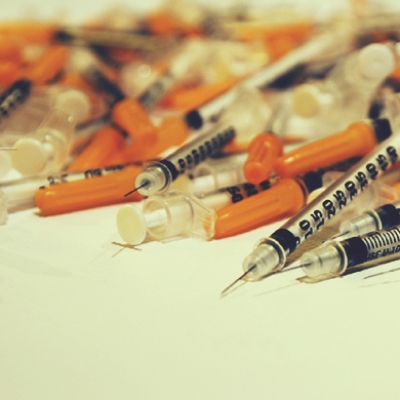The closing of a well-established AIDS prevention program is being felt by its many clients. What’s more, the recent loss of Prevention Works! is affecting the lives of hundreds of volunteers and 11 staff members, committed to the fight against AIDS.
One of those staffers, Zhilphia Turner, is not sure where she will find another job that fits her so well. She has been living with HIV for 22 years and spent 13 years as an outreach worker at Prevention Works! administering HIV testing and serving as head of the program that delivered clean syringes to bedridden clients.
Prevention Works! closed its doors in February after 15 years of providing injection drug users with clean needles to prevent the transmission of HIV/AIDs. Those involved with the nonprofit say it was a casualty of reduced funding and the controversial nature of its primary mission: providing drug users with clean needles.
Prevention Works! began in 1996 as a project of the Whitman-Walker Clinic running on local funding. Two years later, it became an independent organization after Congress passed legislation forbidding D.C. from using its local government funds to support harm reduction services and prohibiting organizations that received federal funding from operating a syringe exchange program.
In 2007, the policy was reversed and organizations were allowed to use local government funds to provide needle exchange services. With this reversed policy, three other needle exchange programs got started.
But adequate funding continued to be a concern at Prevention Works! said Mary Beth Levin, the director of organizations programs and services. “Just because the money is approved, doesn’t mean that it’s available,” she said. “We really needed support throughout and we haven’t gotten that” She worries that closing the program will have a wider impact on prevention efforts around the city. “My concern is that we not lose momentum from that support just because of the closing of Prevention Works!.”
The targeted population for Prevention Works! includes injection drug users, as well as those who need HIV testing and HIV case management for people who have tested positive. Narcotics anonymous and education are also a substantial part of Prevention Works!
Levin defended the philosophy of harm reduction. Critics contend that giving addicts clean needles makes it easier for them to continue to use drugs. But supporters of the approach maintain that they are helping keep people alive long enough to address their addictions and change their lives. Needle exchange isn’t needle distribution.
“One of the benefits of harm reduction and needle exchange programs is that we get dirty needles off the streets,” she said. “It also prevents the transmission of HIV and hepatitis among drug users.”
Clients have the option to be transferred to Bread for the City, HIPS or Family Medical Counseling services to continue safe needle exchange, HIV testing and other services.
Although other prevention programs will accept Prevention Works! clients, funds are not available to provide jobs for the Prevention Works! employees.
“They are all eager, but don’t have the money right now,” said Levin.
Turner was living in New York, but relocated to D.C. before giving birth to her third child in 1989; shortly after, doctors informed Turner that her baby was HIV positive.
After an HIV test, Turner also discovered that she was HIV positive.
Turner’s two older children, who were fathered by a different man, were also tested, but results showed that they were not infected.
Once confronted, her ex, an intravenous drug user, confessed that he was HIV positive and had been for many years. “
He didn’t want to tell me because he said he was scared that I would leave him,” Turner said. He died two years later from AIDS-related complications.
Twenty years later, her daughter is a sophomore at North Carolina State University and is no longer HIV positive.
Turner took her daughter to the hospital for repeated treatments of one of the first drugs that was found to fight AIDS, Zidovudine. Although her daughter’s treatments were successful, Turner remains HIV positive.
“He’s [her ex] dead, she doesn’t have it anymore, but I’m stuck with it,” she said.
Turner’s daily pill intake has declined from 27 to 12. But the side effects of the medicine are something that will continually affect her health.
“I have developed high blood pressure and high cholesterol from the medicine, but my T-cells are over 1,000, so that’s good,” she said.
Healthy HIV negative adults have between 600 and 1,200 cells per micro liter of blood. As a person’s HIV progresses to AIDS, their T-cell count can drop to 200 cells per micro liter of blood.
“Protect yourself and get tested. It’s not a joke,” Turner stressed. “If you have HIV, it turns into AIDS eventually and you have to take medicine for the rest of your life.”








